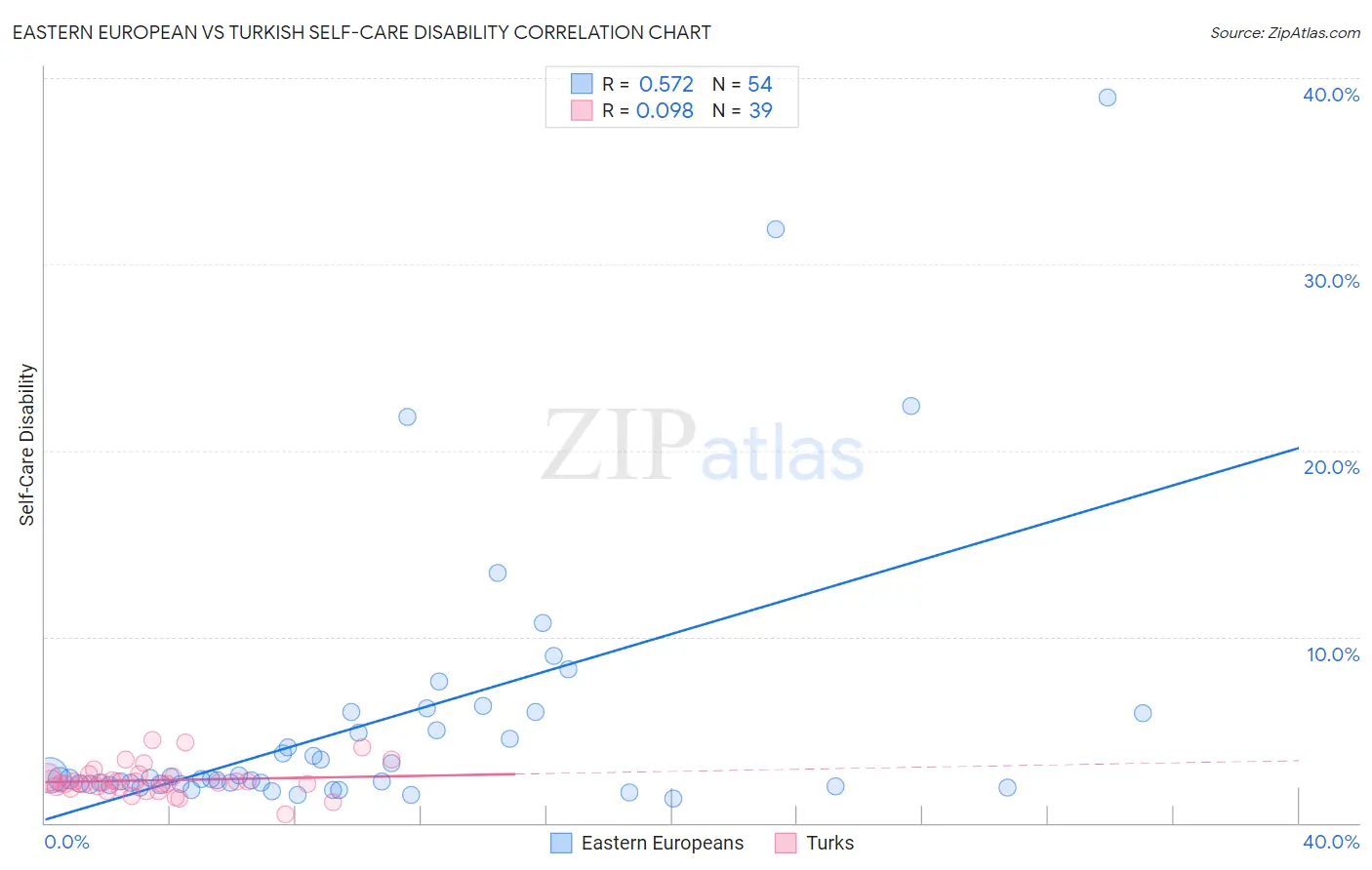Eastern European vs Turkish Self-Care Disability
COMPARE
Eastern European
Turkish
Self-Care Disability
Self-Care Disability Comparison
Eastern Europeans
Turks
2.3%
SELF-CARE DISABILITY
99.2/ 100
METRIC RATING
72nd/ 347
METRIC RANK
2.2%
SELF-CARE DISABILITY
100.0/ 100
METRIC RATING
25th/ 347
METRIC RANK
Eastern European vs Turkish Self-Care Disability Correlation Chart
The statistical analysis conducted on geographies consisting of 460,402,865 people shows a substantial positive correlation between the proportion of Eastern Europeans and percentage of population with self-care disability in the United States with a correlation coefficient (R) of 0.572 and weighted average of 2.3%. Similarly, the statistical analysis conducted on geographies consisting of 271,627,212 people shows a slight positive correlation between the proportion of Turks and percentage of population with self-care disability in the United States with a correlation coefficient (R) of 0.098 and weighted average of 2.2%, a difference of 3.7%.

Self-Care Disability Correlation Summary
| Measurement | Eastern European | Turkish |
| Minimum | 1.3% | 0.49% |
| Maximum | 39.0% | 4.5% |
| Range | 37.7% | 4.0% |
| Mean | 5.4% | 2.3% |
| Median | 2.4% | 2.2% |
| Interquartile 25% (IQ1) | 2.1% | 1.9% |
| Interquartile 75% (IQ3) | 5.9% | 2.5% |
| Interquartile Range (IQR) | 3.8% | 0.61% |
| Standard Deviation (Sample) | 7.4% | 0.81% |
| Standard Deviation (Population) | 7.3% | 0.80% |
Similar Demographics by Self-Care Disability
Demographics Similar to Eastern Europeans by Self-Care Disability
In terms of self-care disability, the demographic groups most similar to Eastern Europeans are Asian (2.3%, a difference of 0.030%), Immigrants from Egypt (2.3%, a difference of 0.030%), Immigrants from Northern Europe (2.3%, a difference of 0.070%), Immigrants from Switzerland (2.3%, a difference of 0.090%), and Immigrants from Zaire (2.3%, a difference of 0.10%).
| Demographics | Rating | Rank | Self-Care Disability |
| Brazilians | 99.3 /100 | #65 | Exceptional 2.3% |
| Immigrants | Argentina | 99.3 /100 | #66 | Exceptional 2.3% |
| South Africans | 99.3 /100 | #67 | Exceptional 2.3% |
| Immigrants | Zaire | 99.2 /100 | #68 | Exceptional 2.3% |
| Immigrants | Norway | 99.2 /100 | #69 | Exceptional 2.3% |
| Immigrants | Northern Europe | 99.2 /100 | #70 | Exceptional 2.3% |
| Asians | 99.2 /100 | #71 | Exceptional 2.3% |
| Eastern Europeans | 99.2 /100 | #72 | Exceptional 2.3% |
| Immigrants | Egypt | 99.1 /100 | #73 | Exceptional 2.3% |
| Immigrants | Switzerland | 99.1 /100 | #74 | Exceptional 2.3% |
| Immigrants | Netherlands | 99.1 /100 | #75 | Exceptional 2.3% |
| Immigrants | China | 99.1 /100 | #76 | Exceptional 2.3% |
| Immigrants | Middle Africa | 99.0 /100 | #77 | Exceptional 2.3% |
| Immigrants | Ireland | 99.0 /100 | #78 | Exceptional 2.3% |
| Immigrants | Kenya | 99.0 /100 | #79 | Exceptional 2.3% |
Demographics Similar to Turks by Self-Care Disability
In terms of self-care disability, the demographic groups most similar to Turks are Immigrants from Sri Lanka (2.2%, a difference of 0.070%), Venezuelan (2.2%, a difference of 0.080%), Cypriot (2.2%, a difference of 0.11%), Inupiat (2.2%, a difference of 0.24%), and Immigrants from Zimbabwe (2.3%, a difference of 0.33%).
| Demographics | Rating | Rank | Self-Care Disability |
| Immigrants | Taiwan | 100.0 /100 | #18 | Exceptional 2.2% |
| Immigrants | Eritrea | 100.0 /100 | #19 | Exceptional 2.2% |
| Tongans | 100.0 /100 | #20 | Exceptional 2.2% |
| Bulgarians | 100.0 /100 | #21 | Exceptional 2.2% |
| Immigrants | Venezuela | 100.0 /100 | #22 | Exceptional 2.2% |
| Cambodians | 100.0 /100 | #23 | Exceptional 2.2% |
| Cypriots | 100.0 /100 | #24 | Exceptional 2.2% |
| Turks | 100.0 /100 | #25 | Exceptional 2.2% |
| Immigrants | Sri Lanka | 99.9 /100 | #26 | Exceptional 2.2% |
| Venezuelans | 99.9 /100 | #27 | Exceptional 2.2% |
| Inupiat | 99.9 /100 | #28 | Exceptional 2.2% |
| Immigrants | Zimbabwe | 99.9 /100 | #29 | Exceptional 2.3% |
| Paraguayans | 99.9 /100 | #30 | Exceptional 2.3% |
| Danes | 99.9 /100 | #31 | Exceptional 2.3% |
| Burmese | 99.9 /100 | #32 | Exceptional 2.3% |